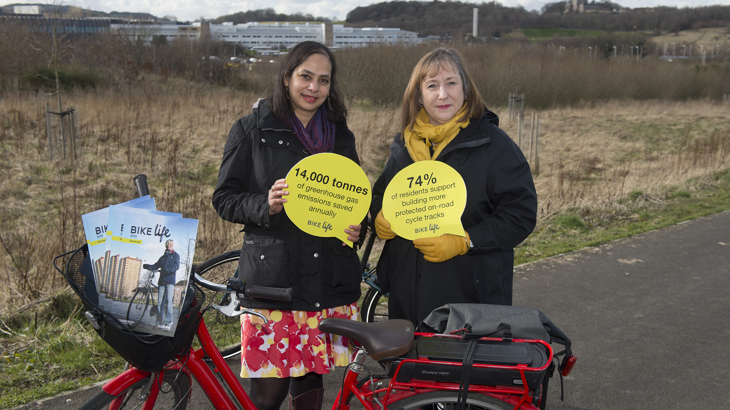More needs to be done to make cycling participation equal in Edinburgh according to the UK’s most comprehensive assessment of cycling in cities, Bike Life.

The report which is the third for the Capital, surveyed more than 1,400 Edinburgh residents to find out more about their cycling habits, satisfaction, and the impact of cycling in the city.
It found that only 7% of people with semi-skilled and manual jobs, homemakers or unemployed people (Socio-economic groups (SEGs) D and E) currently cycled at least once a week, and were the least likely to own a car – making it harder for them to reach every day services around the city.
And, whilst almost a third of this group wanted to start cycling, concerns about safety, a lack of confidence, poor storage and changing facilities and the cost of a suitable cycle were all barriers stopping them from cycling.
Kirsty Rankin, Sustrans Scotland Head of Partnerships said:
"By designing and building infrastructure that caters for everyone’s needs we can help ensure cycling participation is more equal in Edinburgh and help improve the overall everyday cycling levels in our cities and towns."
The city of Edinburgh Transport and Environment Convener Councillor, Lesley Macinnes said:
"As well as major projects like the City Centre West to East Link and Meadows to George Street improvements, our draft City Mobility Plan prioritises people travelling on foot, bike and public transport, while City Centre Transformation will create calmer, cycle-friendly spaces in the heart of Edinburgh.
"Through this ambitious approach we hope to encourage people from all backgrounds to consider cycling as a healthy, sustainable and environmentally-friendly mode of transport."
Run by Sustrans Scotland in partnership with City of Edinburgh Council, Bike Life is part of a wider piece of research by Sustrans covering 17 cities across the UK and Ireland, assessing cycling development, attitudes and behaviour in each city.
The report also found that women, people from minority ethnic groups and disabled people were all less likely to travel than their white, male, non-disabled counterparts.
Key statistics from Bike Life Edinburgh report
- Only 7% of Edinburgh residents from socio-economic groups D and E currently cycle at least once a week
- 30% of Edinburgh residents from socio-economic groups D and E would like to start cycling and the largest barrier is concerns about safety
- 66% of Edinburgh residents from socio-economic groups D and E do not have a car or van in their household (compared to 11% in socio-economic groups A and B). This means that having access to alternative, affordable forms of transport is essential in enabling access to employment, education, health and other facilities
- 62% of Edinburgh residents would like to see more government spending on cycling
- 65% of Edinburgh residents think fewer motor vehicles on their streets would be useful to help them cycle more
- 74% of residents support building more protected on-road cycle tracks, even when this would mean less room for other road traffic.





